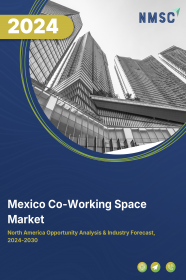
Mexico Co-Working Space Market by Space Type (Shared Open Spaces, Enclosed Private Suites, Virtual Office Solutions, Event/Meeting Facilities), by Membership Type (Hot Desks, Dedicated Desks, and Others), by Business Type (Standard Coworking, and Others), by Business Model (Direct Ownership/Operation, and Others), by End User (Freelancers/Remote Workers, and Others), by Industry Vertical (Technology & IT Services, and Others) - Opportunity Analysis and Industry Forecast, 2024–2030
Industry: ICT & Media | Publish Date: 04-Nov-2025 | No of Pages: 157 | No. of Tables: 120 | No. of Figures: 65 | Format: PDF | Report Code : IC2019
Industry Overview
The Mexico Co-Working Space Market size was valued at USD 172.8 million in 2023, and is predicted to reach USD 521.9 million by 2030, at a CAGR of 17.0% from 2024 to 2030. Co-working space represents a dynamic and adaptable solution to the evolving needs of businesses. These shared work environments offer flexibility in lease terms and space requirements, appealing particularly to startups and small enterprises seeking to avoid the upfront costs associated with traditional offices. The communal atmosphere encourages networking and collaboration among professionals from diverse fields, fostering innovation and creativity.
Equipped with modern amenities and strategically located, these managed workspaces provide cost-effective, scalable, and accessible alternatives for companies seeking a central presence without the constraints of long-term leases. The industry has experienced significant growth as businesses recognize the benefits of this model, embracing the collaborative opportunities and resource-sharing inherent in co-working spaces.
Evolving Working System in Mexico Fuels the Growth of the Co-working Space Market
Mexico is rapidly becoming a hub for freelancers, digital nomads, and remote professionals, significantly driving the expansion of its co-working space market. Cities such as Mexico City, Guadalajara, Tulum, Playa del Carmen, and Mérida have emerged as top destinations for location-independent workers due to their vibrant urban culture, affordable cost of living, and strong coworking infrastructure. The widespread availability of high-speed internet and lifestyle-oriented coworking spaces has made these urban centers particularly attractive to North American and European professionals. Major coworking providers like WeWork, IWG (Regus and Spaces), and local operators such as Público, Homework, and Centraal have expanded their footprint across these cities. These companies offer a variety of flexible workspace solutions—ranging from hot desks and private suites to collaborative lounges—catering to the evolving demands of a mobile, tech-savvy workforce. Additionally, Mexico’s young, skilled talent pool is encouraging foreign companies to establish satellite offices in the country, further boosting demand for modern, flexible work environments.
Growing Startups in Mexico Drive the Co-working Space Market Growth
Mexico’s fast-growing startup ecosystem is playing a critical role in fueling demand for coworking spaces. The country is home to a rising number of early-stage and growth-stage companies, especially in sectors like fintech, logistics, health tech, and e-commerce. With over 300 fintech startups and expanding clusters of tech-driven SMEs, the need for cost-effective, scalable, and flexible office solutions has intensified. Coworking spaces offer startups the agility to scale operations up or down quickly—an essential feature for navigating uncertain business cycles. Moreover, coworking environments provide access to networking, mentorship, and innovation communities that are crucial for young companies. The venture capital landscape further underscores this momentum; in late 2023, for example, NXTP raised USD 98 million to invest in startups in Mexico and Brazil, signaling strong investor confidence in the region. As capital continues to flow into the Mexican innovation ecosystem, coworking spaces are becoming an integral part of the entrepreneurial infrastructure, offering startup founders plug-and-play solutions that support collaboration, creativity, and business growth.
Growing Cybersecurity Challenges in Mexico Pose a Barrier to Co-working Space Market Growth
The growing demand for flexible workspaces in Mexico is accompanied by rising concerns over cybersecurity, which pose a significant challenge to the coworking space market. Shared networks and open-access systems commonly used in these environments increase the risk of data breaches and unauthorized access, especially for companies handling sensitive information in industries such as legal services, finance, and healthcare. Additionally, the communal nature of coworking spaces raises security issues related to physical access control, device safety, and network reliability. While many premium providers are investing in advanced IT infrastructure and security protocols, smaller or independent operators often lack the resources to meet enterprise-grade cybersecurity requirements. This gap can discourage larger firms or clients with stringent data protection needs from utilizing coworking spaces. To ensure sustainable market growth, coworking operators in Mexico must strengthen their cybersecurity measures and foster greater trust among users who prioritize secure and protected work environments.
Integration of AR and VR in Mexico’s Co-working Spaces Offers Future Market Opportunities
The incorporation of Augmented Reality (AR) and Virtual Reality (VR) technologies into coworking spaces presents a significant opportunity for innovation in Mexico’s flexible workspace market. These immersive technologies are transforming how remote collaboration and virtual presence are experienced, allowing users to engage in virtual meetings, workshops, and networking activities with a stronger sense of participation and interactivity. While still emerging in the Mexican context, global developments—such as the launch of the Spacetop AR laptop by Sightful, which raised USD 61 million—are setting the stage for broader adoption across Latin America. Forward-thinking coworking operators in Mexico have an opportunity to differentiate themselves by piloting AR/VR-enabled meeting rooms, virtual training environments, and remote collaboration hubs. As hybrid work models become more sophisticated, offering high-tech, immersive workspace solutions could attract startups, creative teams, and tech-focused clients looking for enhanced digital collaboration tools, positioning these operators at the forefront of the next generation of flexible workspaces.
Competitive Landscape
The Mexico co-working space industry comprises various companies, including IOS OFFICES S. de R.L. de C.V., IWG (Regus & Spaces), WeWork Mexico S. de R.L. de C.V., Selina Hospitality PLC, ABE Oficinas, The Pool S.C., Workology, Venture X México S. de R.L. de C.V., Mutuo Coworking, Colabora, Impact Hub Mexico, A.C., SACH Coworking, Openhub Coworking, Estudio Infame, Homework S.A. de C.V., and others.
Mexico Co-Working Space Market Key Segments
By Space Type
-
Shared Open Spaces
-
Enclosed Private Suites
-
Virtual Office Solutions
-
Event/Meeting Facilities
By Membership Type
-
Hot Desks
-
Dedicated Desks
-
Private Office Leases
-
Hybrid Flex Passes
By Business Type
-
Standard Coworking
-
Premium Managed Offices
-
Niche/Specialized Spaces
By Business Model
-
Direct Ownership/Operation
-
Franchise/Partnership
-
Real Estate Collabs
By End User
-
Freelancers/Remote Workers
-
Startups (<10 Employees)
-
SMEs (10–250 Employees)
-
Large Enterprises (>250)
By Industry Vertical
-
Technology & IT Services
-
Financial & Professional
-
Healthcare & Life Sciences
-
Manufacturing & Logistics
-
Public Sector & Education
-
Others
Key Players
-
IOS OFFICES S. de R.L. de C.V.
-
IWG (Regus & Spaces)
-
WeWork Mexico S. de R.L. de C.V.
-
Selina Hospitality PLC
-
ABE Oficinas
-
The Pool S.C.
-
Workology
-
Venture X México S. de R.L. de C.V.
-
Mutuo Coworking
-
Colabora
-
Impact Hub Mexico, A.C.
-
SACH Coworking
-
Openhub Coworking
-
Estudio Infame
-
Homework S.A. de C.V.
Report Scope And Segmentation
|
Parameters |
Details |
|
Market Size in 2023 |
USD 172.8 Million |
|
Revenue Forecast in 2030 |
USD 521.9 Million |
|
Growth Rate |
CAGR of 17.0% from 2024 to 2030 |
|
Analysis Period |
2023–2030 |
|
Base Year Considered |
2023 |
|
Forecast Period |
2024–2030 |
|
Market Size Estimation |
Million (USD) |
|
Growth Factors |
|
|
Companies Profiled |
15 |
|
Market Share |
Available for 10 companies |
|
Customization Scope |
Free customization (equivalent up to 80 working hours of analysts) after purchase. Addition or alteration to country, regional, and segment scope. |
|
Pricing and Purchase Options |
Avail customized purchase options to meet your exact research needs. |

















 Speak to Our Analyst
Speak to Our Analyst

























